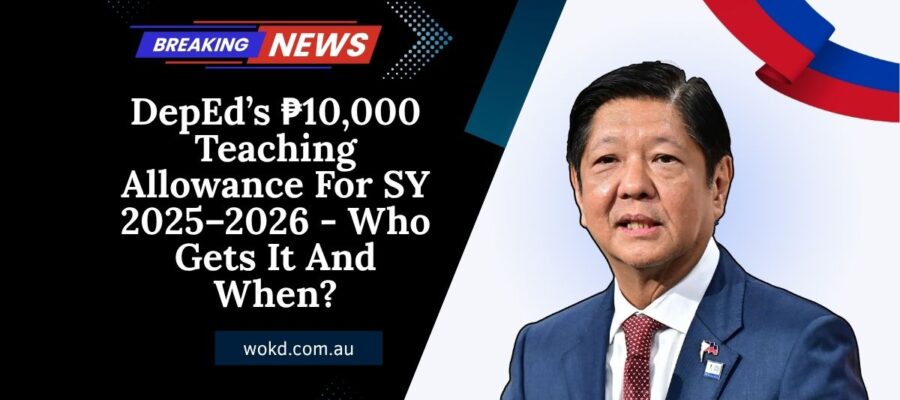The Department of Education (DepEd) has officially confirmed the ₱10,000 Teaching Allowance for all public school teachers for the School Year (SY) 2025–2026.
This is a significant increase from the previous ₱5,000, reflecting the government’s ongoing commitment to ease the financial burden on educators and enhance the quality of education delivery across the country.
What Is the Teaching Allowance?
Also known as the “Chalk Allowance”, the ₱10,000 Teaching Allowance is a cash subsidy given annually to public school teachers to cover classroom-related expenses. This includes:
- Instructional materials
- Internet and communication costs
- Minor repairs of classroom equipment
- Teaching aids and devices
- Personal protective equipment and hygiene kits (if applicable)
This allowance helps reduce the need for teachers to spend from their own pockets for classroom necessities.
Who Is Eligible?
All public school teachers under the DepEd system are eligible, provided they meet specific criteria. Here’s a breakdown:
| Eligibility Criteria | Status |
|---|---|
| Full-time permanent teachers under DepEd | Eligible |
| Contractual or substitute teachers (hired before June 1, 2025) | Eligible |
| Newly hired teachers after June 1, 2025 | Not Eligible |
| Private school teachers | Not Eligible |
| Retired, resigned, or separated teachers before SY 2025–2026 | Not Eligible |
Only teachers actively serving in public elementary and secondary schools for the 2025–2026 school year will receive the benefit.
When Will the ₱10,000 Be Paid?
DepEd has set a clear payout schedule for the allowance, which aligns with the preparation period before classes begin. Here’s what to expect:
| Activity | Timeline |
|---|---|
| Evaluation of eligible teachers | May 2025 |
| Payroll preparation and budgeting | Early June 2025 |
| Allowance distribution | June 15 – July 5, 2025 |
| Financial liquidation report period | Until September 2025 |
The allowance will be directly credited to teachers’ payroll accounts to ensure fast and secure disbursement.
Breakdown of the ₱10,000 Allowance
DepEd recommends a flexible use of the ₱10,000 to cover key teaching-related costs. Below is a sample allocation:
| Expense Category | Recommended Budget (₱) |
|---|---|
| Instructional Materials | 3,000 |
| Internet/Data Subscription | 2,000 |
| Printing & Reproduction | 1,500 |
| Online Teaching Tools/Apps | 1,000 |
| Seminars/Training Registration | 1,500 |
| Miscellaneous Supplies | 1,000 |
| Total | 10,000 |
Note: While there are no strict rules on how to divide the funds, teachers must retain proof of spending in case of audits.
Why the Increase Matters
Moreover, this initiative acknowledges the essential role of educators and the personal sacrifices they often make for their students.
How to Receive the Allowance
The process is automatic for eligible teachers:
- No separate application is required.
- Teachers must ensure their employee records are updated with their school’s administration.
- Funds will be deposited directly to the teacher’s payroll account.
- Teachers must later submit a simple report or receipts showing how the allowance was used.
The ₱10,000 Teaching Allowance for SY 2025–2026 is a welcome development for public school educators in the Philippines. It not only eases the burden of out-of-pocket spending but also supports the continuous improvement of teaching standards.
Teachers are urged to use the funds wisely, ensuring every peso goes toward creating a more effective, engaging, and resource-equipped learning environment.
FAQs
Will I receive the allowance if I am newly hired in July 2025?
No. Only teachers hired on or before June 1, 2025, are eligible for the ₱10,000 allowance for SY 2025–2026.
Is there a need to apply to receive the allowance?
No application is needed. The allowance is automatically credited to all eligible teachers’ payroll accounts.
Can the allowance be used for personal expenses?
No. The ₱10,000 is intended strictly for teaching-related expenses. Misuse may result in disqualification from future subsidies or administrative action.

